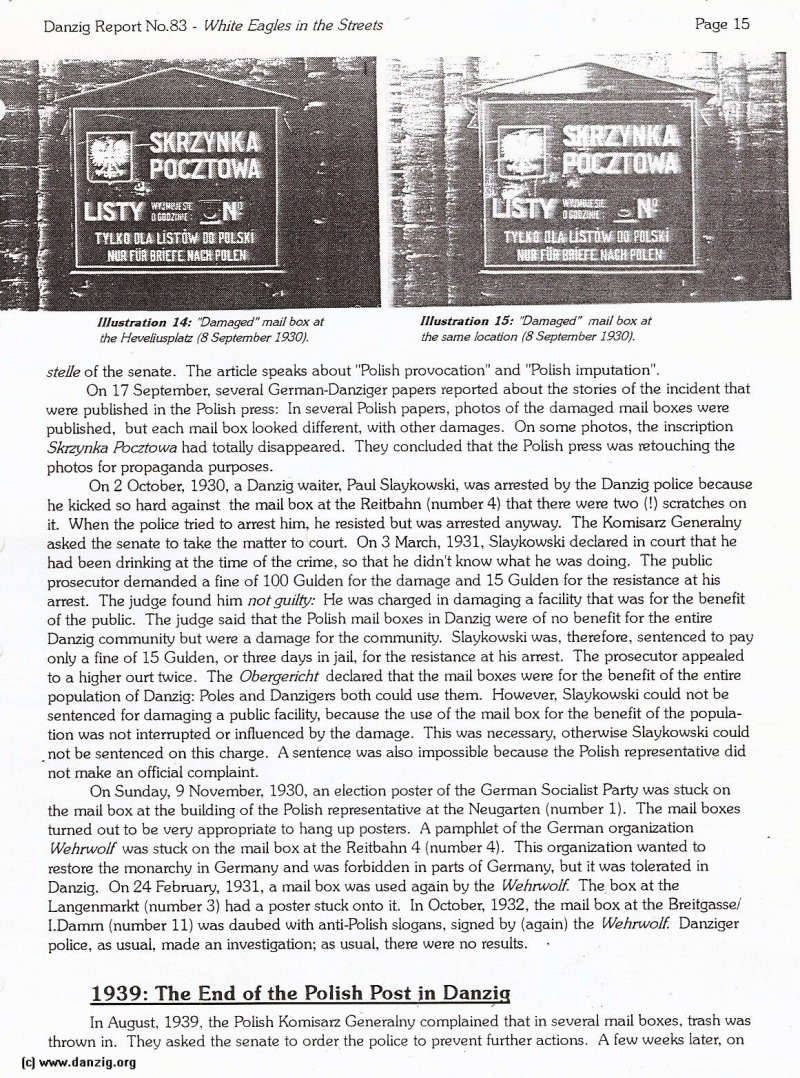
stelle of the senate. The article speaks about ‘Polish provocation” and ‘Polish imputation’.
On 17 September, several German-Danziger papers reported about the stories of the incident that were published in the Polish press: In several Polish papers, photos of the damaged mail boxes were published, but each mail box looked different, with other damages. On some photos, the inscription Skrzynka Pocztowa had totally disappeared. They concluded that the Polish press was ttouching the photos for propaganda purposes.
On 2 October. 1930, a Danzig waiter, Paul Slaykowski. was arrested by the Danzig police because he kicked so hard against the mail box at the Reitbahn (number 4) that there were two (!) scratches on it. When the police tried to arrest him, he resisted but was arrested anyway. The Komisarz Generalny asked the senate to take the matter to court. On 3 March, 1931, Slaykowski declared in court that he had been drinking at the time of the crime, so that he didn’t know what he was doing. The public prosecutor demanded a fine of 100 Gulden for the damage and 15 Gulden for the resistance at his arrest. The judge found him not guilty: He was charged in damaging a facility that was for the benefit of the public. The judge said that the Polish mail boxes in Danzig were of no benefit for the entire Danzig community but were a damage for the community. Slaykowski was, therefore, sentenced to pay only a fine of 15 Gulden, or three days in jail, for the resistance at his arrest. The prosecutor appealed to a higher ourt twice. The Obergericht declared that the mail boxes were for the benefit of the entire population of Danzig: Poles and Danzigezs both could use them. However, Slaykowski could not be sentenced for damaging a public facility, because the use of the mail box for the benefit of the populat ion was not interrupted or influenced by the damage. This was necessary, otherwise Slaykowski could •not be sentenced on this charge. A sentence was also impossible because the Polish representative did not make an official complaint.
On Sunday, 9 November, 1930, an election poster of the German Socialist Party was stuck on the mail box at the building of the Polish representative at the Neugarten (number 1). The mail boxes turned out to be very appropriate to hang up posters. A pamphlet of the German organization Wehrwolf was stuck on the mail box at the Reitbahn 4 (number 4). This organization wanted to restore the monarchy in Germany and was forbidden in parts of Germany, but it was tolerated in Danzig. On 24 February, 1931, a mail box was used again by the Wehiwoif The box at the Langenmarkt (number 3) had a poster stuck onto it. In October, 1932, the mail box at the Breitgasse! LDamm (number 11) was daubed with anti-Polish slogans, signed by (again) the Wehzwolf Danziger police, as usual. made an investigation; as usual, there were no results.
1939: The End of the Polish Post in Danzig
In August, 1939, the Polish Komisarz Generalny complained that in several mail boxes, trash was thrown in. They asked the senate to order the police to prevent further actions. A few weeks later, on
Danzig Report Vol. 1 - Nr. 83 - April - May - June - 1994, Page 17.
Hits: 3322
Added: 09/07/2015
Copyright: 2025 Danzig.org

